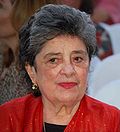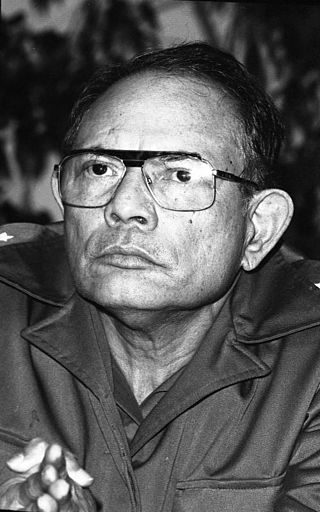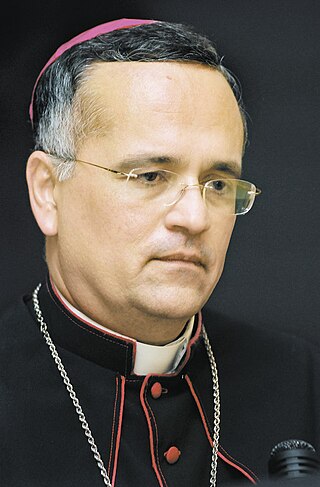| |||||
| Decades: | |||||
|---|---|---|---|---|---|
| See also: | |||||
The following lists events in the year 2018 in Nicaragua .
| |||||
| Decades: | |||||
|---|---|---|---|---|---|
| See also: | |||||
The following lists events in the year 2018 in Nicaragua .


José Daniel Ortega Saavedra is a Nicaraguan politician and the 58th president of Nicaragua since January 10, 2007. Previously, he was leader of Nicaragua from July 18, 1979 to April 25, 1990, first as Coordinator of the Junta of National Reconstruction from July 19, 1979 to January 10, 1985, and then as the 54th President from January 10, 1985 to April 25, 1990. During his first term, he implemented policies to achieve leftist reforms across Nicaragua. In later years, Ortega's left-wing radical politics cooled significantly, leading him to pursue pro-business policies and even rapprochement with the Catholic Church. However, in 2022, Ortega resumed repression of the Church, and has imprisoned prelate Rolando José Álvarez Lagos.

The Sandinista National Liberation Front is a Christian socialist political party in Nicaragua. Its members are called Sandinistas in both English and Spanish. The party is named after Augusto César Sandino, who led the Nicaraguan resistance against the United States occupation of Nicaragua in the 1930s.

The Nicaraguan Revolution began with rising opposition to the Somoza dictatorship in the 1960s and 1970s, the ouster of the dictatorship in 1978–79, and fighting between the government and the Contras from 1981 to 1990. The revolution revealed the country as one of the major proxy war battlegrounds of the Cold War.

Miguel Obando y Bravo, SDB was a Nicaraguan prelate of the Catholic Church. He was the Archbishop of Managua from 1970 to 2005. Pope John Paul II created him a cardinal in 1985.

Tomás Borge Martínez, often spelled as Thomas Borge in American newspapers, was a cofounder of the Sandinista National Liberation Front in Nicaragua and was Interior Minister of Nicaragua during one of the administrations of Daniel Ortega. He was also a renowned statesman, writer, and politician. Tomás Borge also held the titles of "Vice-Secretary and President of the FSLN", member of the Nicaraguan Parliament and National Congress, and Ambassador to Peru. Considered a hardliner, he led the "prolonged people's war" tendency within the FSLN until his death.

Rosario María Murillo Zambrana is a Nicaraguan politician and poet who is the Vice President of Nicaragua, the country's second highest office, since January 2017 and First Lady of Nicaragua since 2007 and from 1985 to 1990 as the wife of President Daniel Ortega. Murillo has served as the Nicaraguan government's lead spokesperson, government minister, head of the Sandinista Association of Cultural Workers, and Communications Coordinator of the Council on Communication and Citizenry. She was sworn in as vice president of Nicaragua on 10 January 2017. In August 2021, she was personally sanctioned by the European Union, over alleged human rights violations.

General elections were held in Nicaragua on 6 November 2011. The incumbent president Daniel Ortega, won a third term in this election, with a landslide victory.

The protests against Daniel Ortega were a series of protests against President of Nicaragua Daniel Ortega and actions performed by his government, the dismantling of the opposition, and violence against peaceful protesters. The protests began in 2014, when the construction of the Nicaragua Canal was about to begin, and several hundred protesters blocked roads and clashed with police during the groundbreaking of the canal. Tens of thousands of Nicaraguans began to protest against President Ortega for what they believe to be a corrupt electoral system.

The Nicaraguan Center for Human Rights is a non-governmental organization based in Managua. Vilma Núñez, a former Sandinista, founded the organization on May 16, 1990, shortly after the election of President Violeta Chamorro.

The Trees of Life are a public art installation in Managua, Nicaragua. Begun in 2013 to honor the 34th anniversary of the Sandinista Revolution, the Trees of Life are a city beautification project of First Lady Rosario Murillo, who has also served as Nicaragua's Vice President since 2017.

The 2018 Nicaraguan protests began on 18 April 2018 following a move by the government of Daniel Ortega to reform social security. Following the deaths of protesters, demonstrations intensified and grew into a large anti-Ortega movement seeking his removal from office.

The Constitution of Nicaragua protects the freedom of the press. However, limitations imposed by the government have restrained the ability of independent media organizations to express divergent views on society and politics. Since 2007, freedom of the press has declined sharply, coinciding with the election of Daniel Ortega as president. Since Ortega's reelection, journalists in Nicaragua have faced escalating violence from the government. As of 2018, Nicaragua is ranked 90th on the Reporters Without Borders World Press Freedom Index.

The April 19 University Movement is a Nicaraguan student movement created on April 25, 2018 in Managua, Nicaragua. The student group opposes the government of Daniel Ortega who from 1979 to 1990 served as the country's first president following the Nicaraguan Revolution, was re-elected in 2006, and is the nation's current President. The April 19 University Movement organized and participated in the 2018–2020 Nicaraguan protests that began April 18th, 2018 in response to Social Security (INSS) reforms. The group has also served as spokesperson in national dialogue.

Rafael Solís Cerda is a Nicaraguan attorney, politician and former Justice of the Supreme Court of Justice (CSJ) of Nicaragua. He served on the Supreme Court for 19 years before resigning in January 2019. Before joining the Supreme Court, Solís had served in the Nicaraguan legislature and as a military leader.

Silvio José Báez Ortega, OCD is a Nicaraguan Discalced Carmelite and a prelate of the Catholic Church. He earned a doctorate from the Pontifical Gregorian University, and then served primarily in Guatemala and the Vatican from 1989 to 2009. In 2009, Pope Benedict XVI appointed him an auxiliary bishop of the Archdiocese of Managua. He left Nicaragua and went into exile in April 2019 after receiving threats against his life.

The 2018 Nicaraguan protests began on 18 April 2018 when demonstrators in several cities of Nicaragua began protests against the social security reforms decreed by President Daniel Ortega that increased taxes and decreased benefits. After five days of unrest in which nearly thirty people were killed, Ortega announced the cancellation of the reforms; however, the opposition has grown through the 2014–2018 Nicaraguan protests to denounce Ortega and demand his resignation, becoming one of the largest protests in his government's history and the deadliest civil conflict since the end of the Nicaraguan Revolution. On 29 September 2018, political demonstrations were declared illegal by President Ortega.

Human rights in Nicaragua refer to personable, political and social rights granted to every human in Nicaragua. Nicaragua derives its understanding of human rights from the Constitution of Nicaragua and international law. Nicaragua is a member state of the United Nations which states that fundamental human rights, such as freedom from slavery and freedom of expression, are enabled for all human beings without discrimination.
Valeska Sandoval is a Nicaraguan university student. She was active in 2018 Nicaraguan protests who has been repeatedly captured by pro-government forces, including once during an assault by pro-government paramilitary groups captured live on Facebook.
The following lists events in the year 2022 in Nicaragua.
This is a timeline of the 2020 Nicaraguan protests. It covers events from February to December 2020.